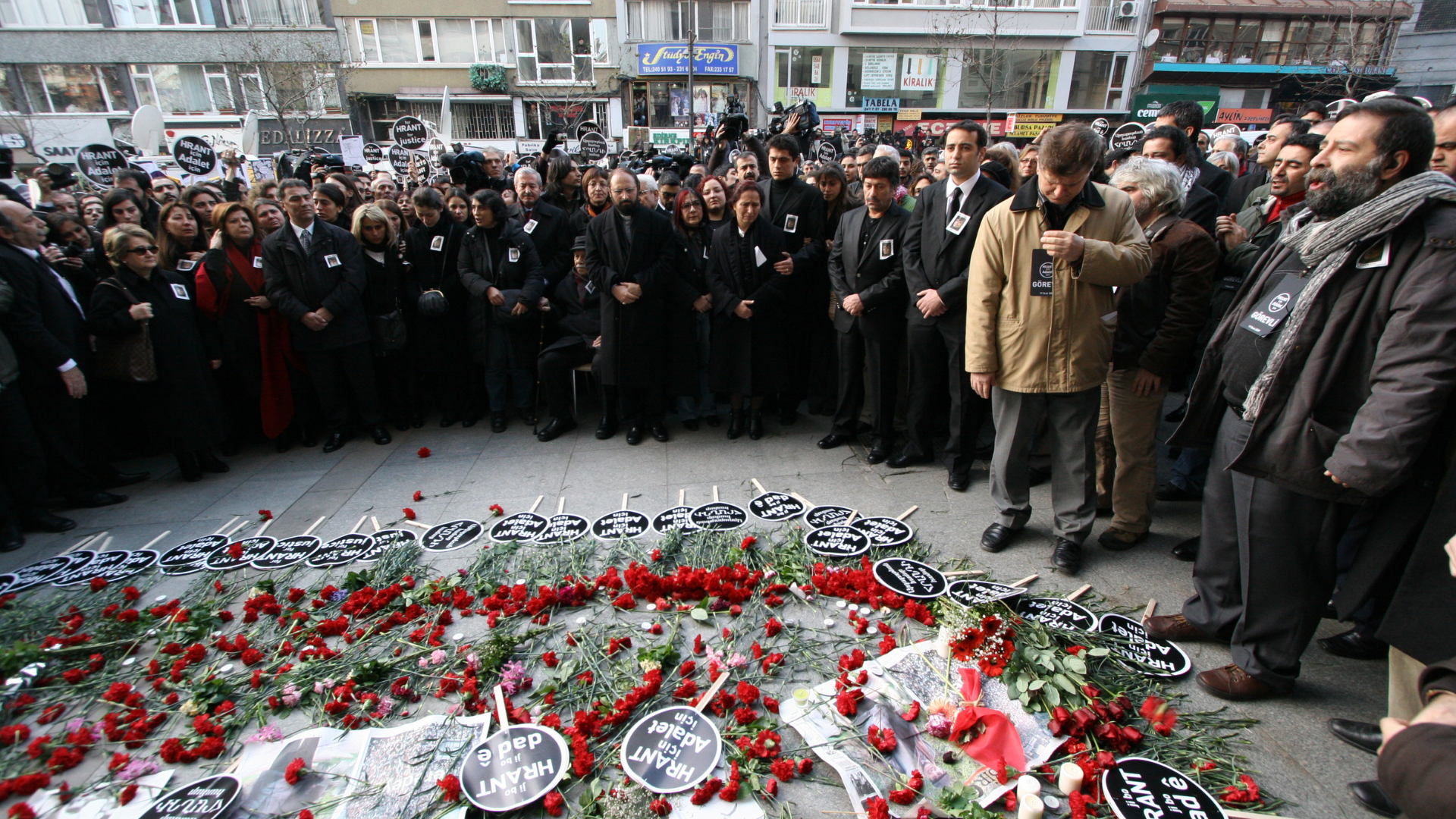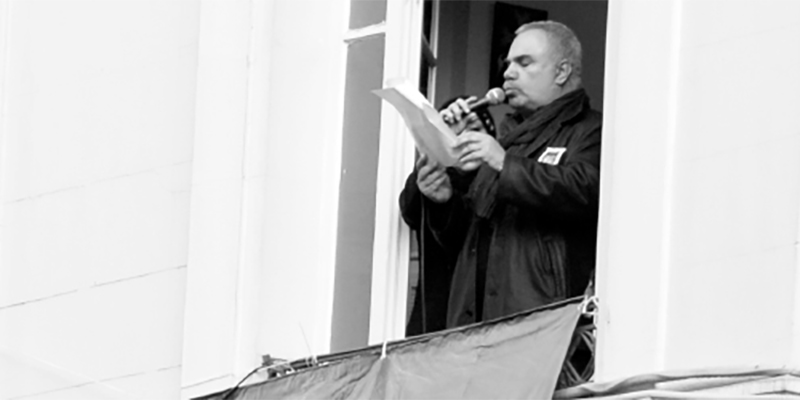Photos: Berge Arabian
Hrant Dink was assassinated 2 years ago in front of Sebat Building which used to house Agos Newspaper. Thousands of people commemorated him on Tuesday, January 19th. Those who participated in the commemoration voiced their demands for justice for the ongoing assassination trial.
This year the speech at the commemoration was held by Halil Ergün, who was a theater and cinema artist.
Halil Ergün's speech:
Halil Ergün - 19.01.2009
Friends of Hrant!
This soil has always fed on deaths.
Haven’t we witnessed all this together?
They murdered our friends in coups; they hanged them.
I was a soldier when they murdered Mahir Çayan and hanged Deniz Gezmis.
They went on murdering the children of enlightenment and honesty.
I was at home when Hrant was shot. I was grief-stricken, I was shattered when I heard the news. Silently I got dressed and went out. I went to the Agos newspaper. I stared at the pavement from far away. I then approached where he had fallen quietly to lay down my flowers. I didn’t want to share my grief with anyone. I didn’t want anyone to see me.
I went up the stairs like a sleepwalker. I looked around the rooms of Agos. I exchanged silent looks with those sitting there. Then I went down, walked through the crowd silently, and headed back home.
My whole body was enveloped in grief.
What was this?
What?..
When the likes of Mahir and Deniz were murdered, I expressed my grief openly. I made phone calls, wrote letters. Yes, I was in agony. I revolted, too. But I shared all this with my friends.
Hrant’s death was something else. I fell silent. I didn’t speak a word to anyone. I was seized by a deep pang of conscience.
What was this deep grief…
What…
This was one injured conscience.
This was a historical shock of the conscience…
That is, Hrant’s big place in our lives.
My brother Hrant was the orphaned child of an orphaned people. And we lost that orphaned child.
Yes,
Hrant was a native of this land. One of its owners. He surrounded people with warmth; he embraced them. He spoke from the inside, as one of us. His words appealed to hearts, emotions and minds.
He was sincere.
When they persecuted him for denigrating Turkishness, he said, “I never insult any nation or let anyone else insult one. I don’t insult Turkishness. Nor do I let others insult Armenianness.”
See…
We now know about the notebooks of Talat Pasha…
From a written statement of this responsible person, we learned that one million Armenians were wiped out from the Ottoman lands as a result of the Forced Migration of 1915.
When Hrant said all this, he was attacked by racists and Ergenekonists. The Ergenekonists were ready during the court cases opened against him. They threatened him.
If we have reached a certain point in the Ergenekon case, this is partly because of the reaction against his murder, as we now clearly see.
Yet…
It isn’t always easy to call the state officials that are liable to account.
The case is making slow progress.
We still have a long way to go to achieve justice.
There are many invisible barriers to break down.
It is now obvious to us that racist, nationalist army officers who had staged coups in the past killed Hrant or had him killed.
Dear friends,
When he passed away, Hrant left the Agos newspaper to us…
If Agos lives, it will enable our friendship with Hrant to endure.
Dear Hrant,
You strived to bring to light the different cultures, the wealth of our country.
You invited Anatolian Armenian musicians from all over the world here.
We first listened to Djivan Gasparyan’s duduk thanks to you.
You were the fellow traveler of the likes of Nazim Hikmet, Yilmaz Güney, Ahmet Kaya…
You were the voice of the other, the silenced, the subaltern, the forgotten…
Nevertheless,
Our sorrow and anger at your death are not matched by justice…
We are patiently following the case…
When I was running for mayor of Beyoglu, I came to you to ask for the support of Istanbul Armenians. Not only did you do your best, but you also told me about those Armenians who cultivated the land around the lake of Iznik, where I was raised, those who built schools, who used to live in the area for ages. I learned this fact, which had so far been a mystery to me, and was very much impressed.
This was a major turning point in my life.
It then became clear to me that those who took you from us were the very people who couldn’t stand this fact being told.
That they were obstacles to sincerity and openness.
Dearest brother!
We could not prevent the murder of January 19.
And now I apologize to you and the Armenians of this land. I invite those here today to apologize altogether.
Hrant, we apologize to you and the Armenians of this country.
We apologize.
We apologize.
|
Halil Ergün was born in Bursa in 1946. He obtained a bachelor’s degree in political science from Ankara University. Along with Vasıf Öngören, Mustafa Alabora and Erdoğan Akduman, he co-founded the Ankara Birlik Sahnesi (Ankara Union Theatre) with the aim of injecting hope into the atmosphere of despair created by the coup d’état of 12 March 1971. Ergün visited almost every city, district, town and even village in Anatolia — some of which did not even have a theatre — bringing the art of theatre into the lives of everyone who had been deprived of it. He was arrested and imprisoned on the grounds that the Ankara Union Theatre was a “clandestine organization”. In 1974, he moved into the world of cinema, with a role in the film Yol (The Road), written by Yılmaz Güney and directed by Şerif Gören. This was followed by many other film roles and a string of awards. |


